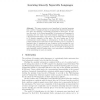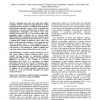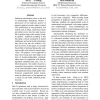34 search results - page 5 / 7 » Learning Circuits with few Negations |
ALT
2006
Springer
14 years 2 months ago
2006
Springer
This paper presents a novel paradigm for learning languages that consists of mapping strings to an appropriate high-dimensional feature space and learning a separating hyperplane i...
JIB
2006
13 years 5 months ago
2006
Protein-protein interactions (PPI) play a key role in many biological systems. Over the past few years, an explosion in availability of functional biological data obtained from hi...
IJET
2007
13 years 5 months ago
2007
—Although some critics may argue that conflict resolution cannot be carried out appropriately by virtual education, the basic elements of conflict present themselves within dista...
LREC
2010
13 years 7 months ago
2010
In this paper, we propose GermanPolarityClues, a new publicly available lexical resource for sentiment analysis for the German language. While sentiment analysis and polarity clas...
ACL
2009
13 years 3 months ago
2009
Sentiment classification refers to the task of automatically identifying whether a given piece of text expresses positive or negative opinion towards a subject at hand. The prolif...



